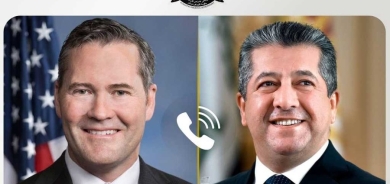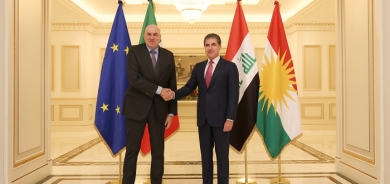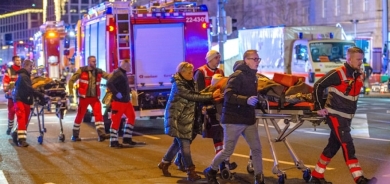THE KRG’S DELICATE BALANCE

The second dimension of this delicate balance is the relationship with Turkey, a situation that has improved dramatically since the initial days following Saddam Hussein’s fall of Turkish “red lines” drawn against so-called Kurdish war lords. Thriving economic relations between the two, however, gradually led to better political relations. In May 2009 the new Turkish foreign minister Ahmet Davutoglu announced his state’s innovative foreign policy of zero problems with its neighbors. Among many other issues, this means that instead of viewing the Iraqi Kurds as an existential enemy threatening its territorial integrity, Turkey now views the KRG through less hostile, potentially cooperative lenses. In October 2009, Davutoglu brought this new policy home by actually visiting Irbil. Then in March 2010 Turkey opened a high-powered consulate in Irbil that serves as a de facto embassy. Finally in June 2010, KRG president Massoud Barzani successfully returned Davutoglu’s earlier visit, by journeying to Ankara where he was most significantly received with his official title of KRG president. Although the issues of Kirkuk and the PKK still remain to cloud relations, it was now practical to envision Turkey as a possible friend or even protector if the KRG’s relationships with Baghdad deteriorated.
The third dimension of the KRG’s delicate balance concerns its relationship with the United States, the KRG’s creator and ultimate protector. However, as the United States begins to wind down its mission in Iraq and assume a non-combat, background role, one wonders what this means for the KRG’s long-term future. Many Kurds hope that their position is now strong enough and a residual U.S. presence in the form of U.S. troops training Iraqi soldiers and shepherding joint Iraqi-KRG troop patrols (so-called Combined Security Mechanisms [csms]) on their dividing line in the disputed areas capable enough to successfully maintain this delicate balance. In January 2010, Barzani himself visited Washington, D.C., met with U.S. president Barack Obama and other senior officials, and received assurances of continuing U.S. support. The KRG maintains a liaison office just nine blocks north of the White House. Qubad Talabani, the son of the Iraqi president, continues as the young and dynamic head of this office and KRG representative in the United States. In May 2010, the U.S. House of Representatives approved Resolution 873 calling for a U.S. consulate in Irbil. (Indeed, there are already 17 other states that have some sort of diplomatic representation in the KRG.) At the end of August 2010, Fuad Hussein, the chief of staff to KRG president Barzani, conducted a week of meetings with US government officials, members of Congress, and the staffs of the Senate foreign relations committee and the House foreign affairs committee.
The fourth dimension of the KRG’s delicate balance concerns its own internal situation. The KRG has been ruled by the so-called Kurdistani List, an alliance of the Kurdistan Democratic Party (KDP) and the Patriotic Union of Kurdistan (PUK), since the fall of Saddam Hussein and actually earlier once the two main Kurdish parties settled their civil war that had raged from 1994-1998. Although this alliance was necessary to avoid further internal strife between the two and was therefore welcomed, the Kurdistani List also reminds one of the criticisms of the Grand Coalitions in Germany during 1966-1969 and then again from 2005-2009. Both times these Grand Coalitions performed adequately, but impaired German democracy because they left only small parties to oppose and criticize. Thus, they made citizens feel that no one could seriously criticize the government, that politics was a game manipulated by the powerful, and that democracy was simply a facade. A good democracy requires a lively interplay between the “ins” and the “outs,” rather than complicity between them. Thus, as soon as a more normal majority was achieved in a subsequent election, the German Grand Coalitions were dissolved. Similarly, the all-party British electoral coalitions in both World Wars were disbanded as soon as the fighting stopped. Indeed, at the height of his power in July 1945, British prime minister Winston Churchill was summarily dismissed by the electorate. The Kurdistani List, however, has demonstrated no inclination to follow suit.
Thus, the rise but uncertain future of Nawshirwan Mustafa’s Gorran (Change) Party at the expense of the PUK creates novel possibilities and uncertainties for the KRG, giving it for the first time a real opposition in its parliament of 111 seats. Rancor and even shootouts between PUK and Gorran supporters, however, serve as an ominous reminder of bloody past intra-Kurdish struggles. This new party won an impressive 25 seats in the KRG parliamentary elections of July 25, 2010, but only a disappointing 8 in the Iraqi national elections held on March 7, 2010. Subsequently, to maintain a necessary united Kurdish front against Baghdad, Gorran agreed to cooperate with the Kurdistani List. Thus, despite all the initial hopes it aroused, the Gorran Party seems destined to be little more than a flash party a la the Poujadists in France during the late 1950s.
An aging Jalal Talabani (born 1933) might either continue as president of Iraq and secretary-general of the PUK or depart from the scene. Either way, however, it is clear that he will not remain much longer. Does this mean that Massoud Barzani’s KDP will soon institute one-party dominance over the KRG? Although only time will tell, it is difficult to see how the PUK can regain its former equal position. Its longtime leader Jalal Talabani will most likely soon retire, while its two longtime deputy leaders are also in effect gone. Nawshirwan Mustafa quit the PUK to head the Gorran Party and Kosrat Rasul has long been ailing. Barham Salih, the current KRG prime minister and PUK politburo member, is bright and capable, but lacks deep roots within the party as he was only brought from abroad and installed by Talabani in 2001. Recently Barham Salih vouched how closely he has been able to work with Massoud Barzani, the longtime leader of the KDP.
In addition, what about the continuing existence of the PKK and PJAK ensconced in the Kandil Mountains, a situation that leads to constant threats of Turkish and Iranian cross-border shellings and even interventions? Although this state of affairs will remain an irritant, the PKK and PJAK presences in Iraqi Kurdistan are not likely to escalate into KRG-threatening scenarios as none of those involved would benefit. Turkey and Iran seek to balance each other in the region; neither would accept the other becoming dominant over the KRG. For its part the KRG will never flagrantly support these two insurgent groups enough to draw in Turkey and/or Iran fully because to do so would threaten the KRG’s existence. In addition, as long as the KRG remains part of Iraq, that state’s recognized territorial integrity will prevent Turkey and/or Iran from seeking to permanently incorporate the KRG. Of course, if Iraq collapses all bets are off.
The future of Kirkuk also remains a crucial internal threat to the KRG’s delicate balance, but is beyond the scope of this brief article. In addition, what do the Islamic elements in the KRG portend for its future? In the KRG parliamentary elections of July 25, 2009, the Kurdistan Islamic Union led by Salahaddin Bahauddin won 5 seats in the 111-seat parliament, while Ali Bapir’s Kurdistan Islamic Group garnered 4 seats. However, a Kurdish maxim explains that compared to an unbeliever, a Kurd is a good Muslim. In other words, although Islamic groups will continue to exist, they seem too splintered and weak to constitute a major threat.
Finally, other dangers to the KRG’s delicate balance concern its position in the regional Middle Eastern arena where a potentially hostile Arab world still regards the KRG existence as a threat to the regional Arab patrimony. The larger Arab region, however, is too divided and full of its own problems to threaten the KRG in any major manner. In addition, as just mentioned, as long as the KRG remains a federal state within Iraq, that state’s territorial integrity offers the KRG protection. Finally, both the EU and UN look favorably upon the KRG, but are unlikely to affect its delicate balance in any meaningful way because both are not immediately involved with the situation and have much more important problems with which to deal.
Michael M. Gunter
Professor of Political Science
Tennessee Technological University &
The International University/Vienna, Austria

 Michael Gunter
Michael Gunter







